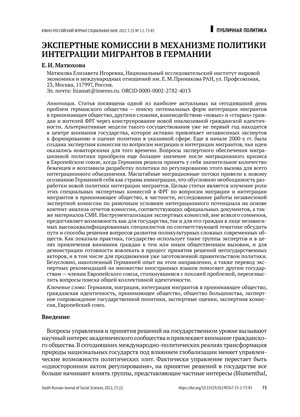Abstract
The article addresses one of the most urgent current problems of the German society, which is to search for the most optimal formats of the integration of migrants into the receiving society; in other words, the interaction of “new” and “old” citizens and residents of Germany through the construction of a new inclusive civic identity. Alternative models of such coexistence have been at the center of the State’s attention for many years, with the active involvement of independent experts in shaping and evaluating policies in this area. Back in the early 2000s. an expert commission on migration and the integration of migrants, whose ideas were groundbreaking for the time, was established in Süssmuth. Issues of expert support of migration policy became even more important after the migration crisis in the European Union, when Germany decided to host a large number of refugees and led the development of a policy to address this challenge for the whole integration association. Large-scale migration flows had led to a new awareness of Germany as a country of immigration, necessitating the development of new policies for the integration of migrants. The purpose of this article is to examine the role of these special expert commissions in the Federal Republic of Germany on migration and the integration of migrants into the host society, in particular, to study the work of the Independent Expert Commission on the framework conditions of integration potential based on content analysis of the Commission’s reports, relevant official documents, and media materials. The instrumentalization of expert commissions undoubtedly provides an opportunity for the state as well as its citizens, represented in the form of independent highly qualified specialists on the relevant topics, to discuss ways and means of dealing with the issues of development of multicultural, complex modern societies. As practice has shown, the state uses such expert groups both to sensitize citizens to certain public challenges and to demonstrate willingness to involve non-state actors in the decision-making, including the promotion of government-brokered policies. Of course, Germany’s experience in this area, as well as the translation of expert recommendations into many foreign languages, help other European Union member states facing a similar problem, rethink the search for a common collective identity.
Keywords
References
- AfD Kompakt. (2021). CDU-Politiker über Merkels Fachkommission: „Arbeitsauftrag bewusst ignoriert“! Retrieved from https://afdkompakt.de/2021/01/28/cdu-politiker-ueber-merkels-fachkommission-arbeitsauftrag-bewusst-ignoriert/
- Die Beauftragte der Bundesregierung für Migration, Flüchtlinge und Integration. Standards für gelingende Integration (2021). Presse- und Informationsamt der Bundesregierung. Retrieved from https://www.integrationsbeauftragte.de/ib-de/integrationsarbeit-in-den-bereichen/forschung-und-integration/standards-fuer-gelingende-integration-1864486
- Berthold, R. (2021, January 28). „Deutschsein neu definieren“. Jungefreiheit.de. Retrieved from https://jungefreiheit.de/politik/deutschland/2021/deutschsein-integrationsbericht/
- Brücker, H. (2021). Der Begriff Migrationshintergrund ist nicht mehr zeitgemäss. Gemeinnützige Hertie-Stiftung. Retrieved from https://www.ghst.de/bruecker-migrationshintergrund/
- Blumenthal von, J. (2006). Governing by Commission: A Way to More Effective Governance or a Loss of Democratic Accountability? German Policy Studies, 3(2), 153–184.
- Der Bundeskanzler. (2021). Pressestatement von Bundeskanzlerin Merkel bei der virtuellen Übergabe des Abschlussberichts der Fachkommission Integrationsfähigkeit. Presse- und Informationsamt der Bundesregierung. Retrieved from https://www.bundeskanzler.de/bk-de/aktuelles/pressestatement-von-bundeskanzlerin-merkel-bei-der-virtuellen-uebergabe-des-abschlussberichts-der-fachkommission-integrationsfaehigkeit-1841180
- Bundesministerium des Innern, für Bau und Heimat. Unabhängige Fachkommission der Bundesregierung zu den Rahmenbedingungen der Integrationsfähigkeit (2021). Bundesministerium des Innern und für Heimat. Retrieved from https://www.bmi.bund.de/DE/themen/heimat-integration/integration/fachkommission-integrationsfaehigkeit/fachkommission-integrationsfaehigkeit-node.html
- Bundesministerium des Innern, für Bau und Heimat. (2021). Die Fachkommission Integrationsfähigkeit. Retrieved from https://www.bmi.bund.de/SharedDocs/downloads/DE/veroeffentlichungen/themen/heimat-integration/integration/bericht-fk-integrationsfaehigkeit.pdf?__blob=publicationFile&v=2
- Dernbach, A. (2021, January 21). Ciao und güle güle, Migrationshintergrund! Der Tagesspiegel. Retrieved from https://www.tagesspiegel.de/meinung/braucht-die-realitaet-neue-worte-ciao-und-guele-guele-migrationshintergrund/26840802.html
- Dernbach, A. (2021, January 20). Kommission: Migrationshintergrund ist nicht mehr zeitgemäß. Der Tagesspiegel. Retrieved from https://www.tagesspiegel.de/politik/wie-integrationsfaehig-ist-deutschland-kommission-migrationshintergrund-ist-nicht-mehr-zeitgemaess/26835492.html
- DESTATIS – Statistisches Bundesamt. (2021). Bevölkerung in Privathaushalten nach Migrationshintergrund Insgesamt. Retrieved from https://www.destatis.de/DE/Themen/Gesellschaft-Umwelt/Bevoelkerung/Migration-Integration/Tabellen/migrationshintergrund-geschlecht-insgesamt.html; jsessionid=AE0E824A3140C6B6E2F2FB27CEC1161E.live711
- Deutscher Bundestag. (2019). Der externe Sachverstand im Geschäftsbereich des Bundesministeriums für wirtschaftliche Zusammenarbeit und Entwicklung (Drucksache 19/11507). Retrieved from https://dserver.bundestag.de/btd/19/115/1911507.pdf
- Deutscher Bundestag. (2021). Stellungnahme der Bundesregierung. Retrieved from https://dserver.bundestag.de/btd/19/302/1930296.pdf
- Die Fachkommission Integrationsfähigkeit. Expertisen (2021). Retrieved from https://www.fachkommission-integrationsfaehigkeit.de/fk-int/dokumente
- Fachkommission Fluchtursachen (2021). Retrieved from https://www.fachkommission-fluchtursachen.de/start
- Knauss, F. (2021, January 21). Staatsministerin Widmann-Mauz: „Der Begriff Migrationshintergrund ist nicht mehr zeitgemäß“. Tichys Einblick. Retrieved from https://www.tichyseinblick.de/kolumnen/knauss-kontert/integrationsbeauftragte-begriff-migrationshintergrund/
- Papier, H. J. (2003, January 31). Reform an Haupt und Gliedern. Eine Rede gegen die Selbstentmachtung des Parlaments. Frankfurter Allgemeine Zeitung.
- Schorpp, M. (2021, May 20). Gemeinsam streiten. Das Online-Magazin der Universität Konstanz. Retrieved from https://www.campus.uni-konstanz.de/wissenschaft/gemeinsam-streiten
- Semenenko, I. S. (2016). Politika identichnosti i identichnost’ v politike: etnonacional’nye rakursy, evropejskij kontekst [Identity Politics and Identities in Politics: Interethnic Perspectives in a European Context]. Polis. Politicheskie issledovaniya [Polis. Political Studies], 4, 8–28. DOI 10.17976/jpps/2016.04.03
- Siefken, S. T. (2007). Expertenkommissionen im politischen Prozess. Wiesbaden: VS Verlag für Sozialwissenschaften.
- Teuteberg, L. (2021, January 27). Viele Probleme sind untergewichtet. linda-teuteberg.de. Retrieved from https://www.linda-teuteberg.de/_files/ugd/dd24b0_65fccfcb027d45758cf8f8eeb26712e2.pdf
- Wagner, G. (2021, January 25). Abschied vom Migrationshintergrund. Frankfurter Allgemeine. Retrieved from https://www.faz.net/aktuell/karriere-hochschule/hoersaal/migration-bericht-der-integrationskommission-der-bundesregierung-17153245.html? GEPC=s3&premium=0x27b08770b72c791fc47e9b2edccbf09e
 Русский
Русский


